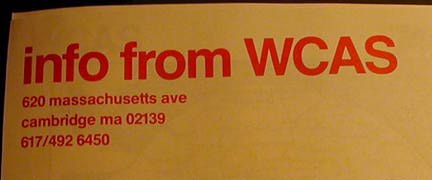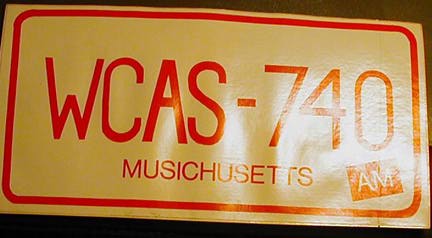WCAS History - page 1

Our "official" letterhead, circa 1972. No mention of "Kaiser/Globe Broadcasting"
Introduction
Thirty years and I haven't bothered, but after a search through various websites, I thought I would clear up some of the mis- and disinformation I found by putting keyboard to screen to tell the story, at least so far as I can remember it.
Here is some of the history of the invention of "acoustic" folk-rock WCAS, Cambridge. It's as much a personal recollection as well. I'm driving this bus, so this is how it goes.
I'm Rick Starr. I ran WCAS, sort of, from somewhere after 1972 thru 1976. The station had a 250 watt daylight only license located electronically at 740 on the AM band, and physically in Cambridge, MA (at 620 Mass Ave) just over the river from Boston. We had a signal you could hear most anywhere in the metropolitan area but we also had a bazillion competitors, both AM and FM, with resources we could only dream about.
| Update: December 10, 2009. Note: Dan Murphy has graciously offered to host these pages on the WCAS website (what better place?), and I have taken him up on the offer. Actually, he offered long ago, but I thought it would be easier for all to just keep them on the AOL site where I first put them. Oops, the borg closed it down with about a week's notice! At any rate, I'm grateful for Dan's offer, and for the effort he's put in to keeping the flame burning. -- Rick |
Early WCAS History
WCAS was 90% owned by Kaiser Broadcasting, and the Boston Globe had the remaining 10% which they were desperately trying to divest since the station was a sinkhole for their good money. The most successful format of the station to that point had been in the late '60's, one of true community service offering news and events from Watertown, Cambridge, Arlington, Somerville, and Belmont, all bedroom communities (cleverly marketed as "Wickus Island") on "the other side" of the river, and all underserved by "Boston" media.
That format was frightfully expensive, with a full news department and news vehicles zipping around covering not much of significance, recaps of town borough meetings and other fascinating fare sure not to attract radio listeners in great numbers. Still, sponsorship was good, or so I am told, but the numbers never balanced and the format was junked in favor of several other, less expensive attempts at "commercial radio." Oldies, mass appeal, soft-rock, they did OK but were mere cannon fodder for the fulltime giants in town and the advertising never followed.
Not counting earlier incarnations as WTAO ('40's/'50's) and WHXR ('50's/early '60's) WCAS was in its fourth or fifth format when I arrived at the station. My appearance was not exactly heralded, I was a part-time DJ doing two shifts on the weekends, closely following a format clock which called for a "B" song to be played at :10 past, and a "C" song at :14 past, and an "oldie" at :17 past and so on. The general format of the music was "soft" and hit based, under the umbrella slogan 'For City Folk', an inside joke because you could pretty much only hear the signal in "the city" (and burbs), coupled with an attempt to connect the "Cambridge" and "folk." Folk, in this context, leaned heavily on John Denver, James Taylor, Peter Paul & Mary and other mass appeal artists; the Weavers and Pete Seeger were unknown in the library. I have a memory of playing Gilbert O'Sullivan ("Alone Again, Naturally") and others, thinking "this is wrong", but I did as I was told. Other acoustic tunes, such as from Bobby Darin or whoever were included by some nameless Music Director deciding what was a "B" or a "C" to fit into the "clock". It was the first "soft-rock"/acoustic station in Boston, so far as I am aware; today it would be called "Lite". If it were still on the air it would still be in mono, with static, and would sign-off at sundown. These are not advantages.
[I do recall Dick Pleasants driving up from the cape for a Sunday afternoon program of actual folk music, culled entirely from his personal collection, in almost the same time slot 'Live at Passim's' would later inhabit. So perhaps there was a bit of traditional folk in the air, after all.]
The ratings were pretty good, I think. I have a memory of a "3" share, although as a weekend DJ living in a converted school bus in a Norwell campground making minimum wage for 8 hours a week, I didn't exactly sit in on the management meetings. A "3 share" today would make you rich, but in those days, WRKO was sporting 20's (or something) and there was WBZ and WHDH and WBCN and WVBF and a bunch of others, our "3" share earning us about 71st place in the ratings.
So the only advertising was left over from the Wickus Island days, faithful furniture stores who had never canceled their contracts, and a couple of gas stations and others who had a personal relationship with the lone, surviving ad salesman, Merrill Smith, a gracious older fellow, a survivor, straight from the Willie Loman school.
It became clear that this new "For City Folk" format was going nowhere, and Kaiser (again) lost interest, inserting a fresh General Manager whose job it was to spruce up the place for sale to someone, anyone, who would take it off their hands. Paul, (I forget his last name, which is probably just as well) had never set foot in a radio station before, being a TV executive, and had no idea of much of anything except "professional management", ho ho ho.

Our "official" sales sheet letterhead. Very hip for a progressive station, eh?
I Take Over
The Program Director left, the midday guy quit, the afternoon guy departed, and I found myself with first, a daily shift ($2 minimum wage, but hey! 25 hours a week!) followed, eventually, by being named Program Director (by default, clearly), charged with "keeping it running" while Paul went out and tried to sell advertising and figure out how to escape from this career death trap.
I threw out the clock. We began changing the music. Gilbert O'Sullivan was out, Joni Mitchell and Judy Collins were in. We had Peter Paul & Mary albums in the library, we had some other "popular" folk music and folkish popular music like Simon & Garfunkel, and we just sort of "slid" into playing music which was more amenable to the sensibility of Cambridge, home to the legendary Club 47 and a rich history of acoustic music. We opened Bob Dylan's repertoire from 3 hit singles to 30 album tracks. A David Bromberg album appeared. Somehow we found a Crosby Stills & Nash LP and put their singles back in the 45rpm bin. Here came Jimmy Buffett, Bonnie Raitt, And others. (I have no memory of where the LP's came from; the record companies didn't provide "back catalog" - I do recall some listeners stopping by and saying "Would you like to play this?" Such was the ethic of the "community", eh?)
If we could play Judy's "Both Sides Now", couldn't we play "Michael From Mountains"? If we could play that, couldn't we also play Joni's? These were big decisions, or so it seemed. It was a progression over time, and it took months to get comfortable and to educate (and change) the staff. My tastes ran more to "pop" in the genre (Linda Ronstadt, Tom Rush, Joni Mitchell), but others later led us to a deep and varied menu including Leo Kottke and Ellen McIlwaine and Tom Paxton and other artists on smaller, ignored labels, and local artists we played from tape, precious as that was.
Some of the following details become blurry, but they are as best I remember them, although the time-line might be a bit off.
I hired Neila Smith to do news and public affairs, although our mandate from Kaiser (through Paul) was to get rid of all the local programming and replace it with syndicated slop, since in those days the FCC listened to community groups which might lose their outlet during a station sale. We did add a couple of syndicated shows, but she also added a bunch of outreach to various ignored and neglected Cambridge groups, many of whom were surprised to find that there was a radio station licensed to Cambridge. (The only other one was WHRB-FM, which oddly enough belonged to Harvard and was non-commercial and non-approachable by other than Harvard students.) Paul never noticed the format change because, I can only assume, he never listened.
We began airing short squibs from the Quakers (American Friends), from women's groups, from peace groups, from gay organizations from other active groups as you might expect to find in Cambridge, and all the while the music submerged into a true progressive vein of folk and folk rock. For a short while I did a combination morning program with Neila, it was not successful, and since we were living together made for some unusual mornings on the radio and in our personal lives.
Donna Halper was hired for one program per week, she did an in-depth folk-music show on Sunday afternoons. For a while she moved into a regular afternoon slot, running from a daily teaching job to be on-air, likely the first woman on the station (ever) and one of the first in Boston. Her primary virtue was that she had her own collection of albums and a wealth of knowledge of that genre of music and was quite good on the radio, but she wanted more hours and more pay and more authority and wasn't shy about asking for it, and we didn't have it to give. Heck, I don't blame her, but the reality was that we had a grand total of two full-time employees at the station: myself and the receptionist, who also doubled as the traffic clerk and billing department. Oh, well there was Paul, and there was Merrill, but Paul faded away, happy to spend more and more time with his friends at Channel 56, and less and less time with us, which suited us fine, too.

My first attempt at a bumper sticker. Note the "Musichusetts". Pretty bad, but luckily it was also unreadable.